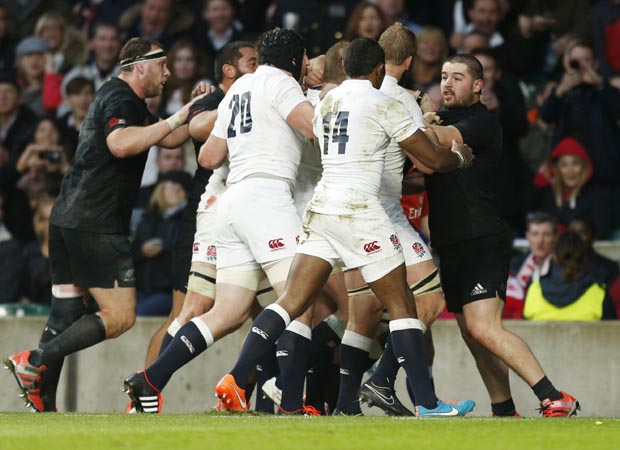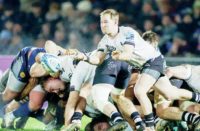 Last Saturday's game against the All Blacks drew the usual response from Stuart Lancaster and the media. Lancaster extolled the progress being made by the team despite losing in a close game, while the Press lamented another loss against the best team in the world and the damage it has done to England's World Cup chances.
Last Saturday's game against the All Blacks drew the usual response from Stuart Lancaster and the media. Lancaster extolled the progress being made by the team despite losing in a close game, while the Press lamented another loss against the best team in the world and the damage it has done to England's World Cup chances.
Lancaster is correct as progress is being made – but is it fast enough given that the World Cup is just ten games away?
Last week showed the England team have strength in depth in virtually every position, as in some positions there were third choice players pushing an experienced All Blacks team all the way.
With England's third choice front-row blowing the All Blacks away and gaining a penalty try and second row debutant George Kruis playing as well as he did when replacing the concussed Courtney Lawes, they have given Lancaster an embarrassing number of quality forwards to choose from going forward.
The worrying aspect is that despite dominating certain set-piece areas of the game, England lacked a coherent attacking game plan even when the All Blacks were reduced to 14 men.
As a simple tactic, the kick and chase game that England chose failed to deliver because either the chase wasn't good enough or the kick was too long, but the question that puzzles me is why, when you are playing against one of the best counter attacking teams in the sport, would you kick the ball to them?
The All Blacks ran more than twice as many metres with the ball in hand as England and were prepared patiently to retain possession and build an attack and, although they conceded more turnovers, they had more than double the number of clean breaks.
Given that England put pressure on the All Blacks lineout with some success, it would have made sense to kick the ball dead and pressure the All Blacks throw.
That would have at least allowed England's backline the luxury of having a set defence in the opposition's half of the pitch, instead of having to try to organise against a fast-moving counter attack.
The Press view that the result could have a negative impact on England come next year's World Cup is absolutely wrong, even our World Cup winners extolling the fact that they had reached No.1 in the world in the build-up to the 2003 victory as a major factor in the win, is rubbish.
In all but the 2003 Cup New Zealand have been the top ranked team in the world and yet they have failed to win on all but two occasions, 1987 and 2011.
Then there is the fact that right now England know for certain only that they will face Australia of the Southern Hemisphere ‘big three'.
There have been seven World Cups and England have faced New Zealand in only three, 1991, 1995 and 1999 losing all three but only in ‘95 did the loss knock England out of the contest.
Each World Cup is a unique event with its own challenges for each of the teams that qualify. For some just being there is enough, for those that aspire to win the one factor they need more than any other is luck. It's a given that every team will be at peak fitness and highly motivated at the start of the Cup and the team that can keep their best players injury free, get the right weather conditions, referees and bounce of the ball (all of which is reliant on luck) will have the best chance of winning.
Speaking of referees, the New Zealand coach, Steve Hansen commented on how he felt Nigel Owens had apparently allowed himself to be influenced by the reaction of the crowd to the big screen replays.
Hansen's criticism surprisingly wasn't directed at Owens but was instead reserved for the TV producers who play controversial footage over and over again.
I don't think that would have been a problem had Owens not reacted by questioning his decisions and also changing the recommended sanction of the TMO.
Owens is regarded as one of the best international referees in the game but last Saturday will certainly be one game he will want to forget. From the moment the replay of Aaron Cruden's try seemed to show that it had not actually been scored, then, the vocal reaction of the crowd, Owens appeared to change how he refereed the game.
Hansen's view that the replays always seem to favour the home team was confirmed when Dane Coles was sent to the sin bin. After the incident was referred by Owens to the TMO, there were repeated replays and crowd reaction to Dylan Hartley holding Coles shirt and Coles petulantly lashing out with his foot.
The TMO could be heard to recommend no yellow card and a ticking off for both players, only for Owens to then issue Coles with a card. Was Owens influenced by the crowd's reaction to the replays or did he make his own decision? Only he knows.
Any act of foul play by a player on a member of the opposition that causes a violent reaction is usually punished, holding or pulling a player's shirt is a professional foul and they are generally punished by a yellow card and yet no action was taken against Hartley.
As an Englishman I am as ‘one eyed' as the next man when it comes to wanting England to win, but not at any price and the crowd appearing to influence refereeing decisions during a game is too high a price to pay.
*This article was first published in The Rugby Paper on November 16.



























